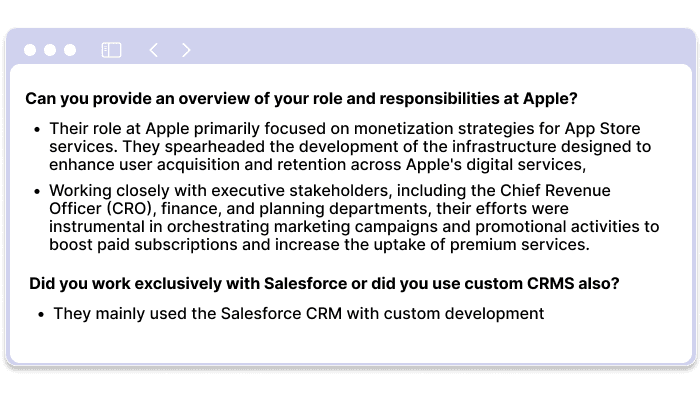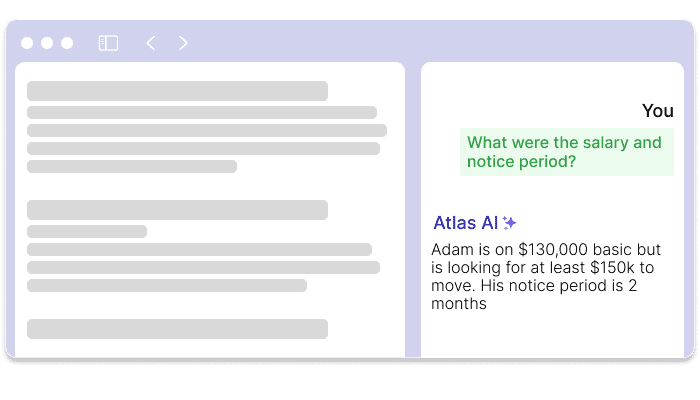💡 Want to see how a recruitment platform powered with Gen AI can make your intake meetings more effective and increase placements?
Get started now
// Recruitment Technology
Make Your Intake Meetings 10x More Effective With AI
16/05/2024
9 MIN
Meet Andrew, an executive search recruiter handling five premium clients. To hit his monthly placement goals, he schedules intake meetings to understand each client’s job needs. But by the end of the week, he’s overwhelmed by notes and calls from various stakeholders. Without proper preparation and guided discussions, he fears missing crucial details and selecting the wrong candidates, risking potential placements. Tough situation, right?
Intake meetings can truly put your time management skills to the test, especially when you’re dealing with senior-level roles or niche skill sets.
📊 For 54% of recruiting pros, the No.1 objective is hiring high quality candidates. Future of Recruiting Playbook, 2024, LinkedIn
That’s why today’s savvy recruiters are increasingly using AI recruitment software to make their intake meetings more efficient. Let’s explore how AI-powered tools can transform your intake meeting experience for recruiters like you.

6 Ways AI Transforms Intake Meetings and Elevates Recruiter Efficiency
Feeling overwhelmed by the demands of multiple clients and stakeholders? We get it. Intake meetings can be intense.
There are many essential elements to consider — from validating hypotheses with stakeholders, aligning on processes, to defining job role expectations, and specifying required profiles. Here are six methods to leverage AI for more efficient management of your intake meetings:
1. Effortless Planning: The Power of Automated Agenda Creation
Intelligent AI platforms can automatically generate agendas for intake meetings based on predefined templates and input from recruiters. By analysing historical data, job descriptions, and candidate profiles, AI algorithms can identify relevant discussion topics, key requirements, and action items, saving recruiters time and effort in preparing for meetings.
💡Imagine you’re scheduling an intake meeting for a new job opening. With automated agenda creation, the AI platform instantly generates a comprehensive agenda based on predefined templates and historical data. It pulls information from the job description, previous similar roles, and candidate profiles to identify relevant discussion topics.
The agenda may include items such as job requirements, desired candidate qualifications, cultural fit considerations, and interview process details.
This saves you valuable time that would otherwise be spent manually crafting the agenda, ensuring that all critical points are covered efficiently.
2. Guided Discussions: Unlock Efficiency with Smart Agenda Suggestions
AI platforms can suggest agenda items based on real-time data and insights, ensuring that all relevant topics are addressed during intake meetings. By analysing past meeting outcomes, candidate feedback, and hiring manager preferences, AI algorithms can recommend agenda items tailored to the specific needs of each meeting, facilitating productive discussions and decision-making.
💡Let’s say you’re in an intake meeting with a hiring manager to discuss a new job opening. As the discussion progresses, the AI platform analyses real-time data and insights to suggest additional agenda items based on the context of the conversation.
For example, if the hiring manager mentions a specific skill set they’re looking for in candidates, the AI platform can suggest adding a discussion item about candidate sourcing strategies for finding profiles with that skill set.
This ensures that all relevant topics are addressed during the meeting, facilitating productive discussions and decision-making.
3. Transcription Magic: How NLP Assistants Revolutionise Intake Meetings
AI-powered Natural Language Processing (NLP) assistants can transcribe and summarise intake meeting discussions in real-time, capturing key insights, action items, and decisions. NLP assistants deploy machine learning models to analyse speech patterns, sentiment, and context. This enables them to extract valuable information from conversations and generate meeting summaries automatically, enabling recruiters to focus on engaging with stakeholders and driving outcomes.
Imagine you’re in an intake meeting with a hiring manager discussing a new job role. As the conversation unfolds, the NLP assistant transcribes and summarises the discussion in real-time. It captures key insights, action items, and decisions made during the meeting.
💡 For instance, if the hiring manager expresses a preference for candidates with specific industry experience, the NLP assistant will highlight this point in the meeting summary. This allows recruiters to focus on engaging with stakeholders while ensuring that important information is captured accurately and efficiently.
4. Efficient Documentation: Master Intelligent Note-Taking in Meetings
AI platforms can facilitate intelligent note-taking during intake meetings, allowing recruiters to capture important details, candidate requirements, and hiring preferences efficiently. By integrating with CRM systems and candidate databases, AI algorithms can categorise and organise meeting notes automatically, making them easily accessible for future reference and analysis.
💡 Picture yourself conducting an intake meeting for a new job role. With intelligent note-taking, the AI platform aids by automatically capturing key details discussed during the meeting. As the conversation progresses, the platform categorises and organises the information, encompassing candidate requirements, hiring preferences, and action items.
This streamlined process guarantees that no critical details are overlooked, enabling you to concentrate on engaging with stakeholders instead of manually jotting down notes. Later on, these notes are readily available for reference, data analysis, and decision-making, empowering you to advance confidently in your hiring process.
With Atlas AI Interview Notes, you get AI-generated transcripts for every interview, a super-smart AI-powered summary, and customizable templates to organise your notes just how you like them. You can also ask questions to get detailed responses from the interview.
Learn more
5. Next Steps Simplified: Leverage Smart Follow-Up Recommendations
After the intake meeting, AI platforms can provide smart follow-up recommendations based on meeting outcomes and action items. By analysing meeting summaries, notes, and feedback, AI algorithms can suggest next steps, timelines, and communication or outreach strategies to ensure that your hiring process progresses smoothly and efficiently.
💡 Let’s say you’ve just wrapped up an intake meeting for a new job opening. With smart follow-up recommendations, the AI platform analyses meeting outcomes and action items to suggest next steps and timelines.
For example, based on the discussion, the platform might recommend scheduling follow-up interviews with specific candidates within a certain timeframe or sending personalised communications to keep stakeholders informed about the progress.
6. Unified Insights: Collaborative Decision-Making Tools for Effective Meetings
AI platforms can facilitate collaborative decision-making among stakeholders during intake meetings, enabling real-time feedback, consensus-building, and alignment on key hiring criteria. By providing interactive dashboards, visualisations, and analytics, AI tools empower recruiters and hiring managers to make informed decisions based on data-driven insights and collective expertise.
💡 Imagine yourself in a scenario where multiple stakeholders are engaged in an intake meeting to discuss hiring criteria for a new role. Collaborative decision-making tools provided by the AI platform come into play, facilitating real-time feedback and consensus-building among all participants.
For instance, interactive dashboards and visualisations enable you and other stakeholders to review candidate profiles, compare qualifications, and vote on preferred attributes. Moreover, the platform may offer analytics on hiring trends or industry benchmarks to further inform your decision-making process.
Through fostering collaboration and alignment on key criteria, these tools empower you and your colleagues to make informed decisions collectively, thereby driving efficiency and effectiveness in the hiring process.
Intake Meetings FAQs
What is the job intake process?
The job intake process lays the groundwork for successful candidate sourcing and hiring. Essentially, it involves gathering comprehensive information from hiring managers or clients to understand their specific hiring needs and preferences.
The job intake process typically delves into various aspects of the role, including job responsibilities, required qualifications, desired skills, and cultural fit. You may also discuss details such as compensation, benefits, and the hiring timeline.
This process helps you align your search criteria with the organisation’s goals, ensuring that you identify and attract the most suitable candidates for the job.
By gaining a thorough understanding of these factors, you can develop targeted recruitment strategies and effectively communicate the value proposition to potential candidates.
Ultimately, intake meetings set the stage for a successful recruitment process, enabling you to tailor your approach and identify candidates who not only meet the job requirements but also align with the organisation’s culture and values.
What are intake calls?
Intake calls, also known as intake meetings or discovery sessions, are structured conversations between recruiters and hiring managers or clients to gather essential information about a job opening.
During an intake call, recruiters typically ask a series of targeted questions to understand the specifics of the role and the desired candidate profile. They may inquire about the responsibilities of the position, the skills and qualifications required, the team dynamics, and any unique challenges or opportunities associated with the role.
Intake calls allow you to gain insights into the job requirements, candidate preferences, and organisational culture.
They also provide an opportunity for you to clarify any ambiguities, address concerns, and establish expectations with hiring managers or clients. By actively listening to their input and feedback, you can ensure alignment between your recruitment efforts and the organisation’s objectives.
Overall, intake calls play a vital role in setting the stage for a successful recruitment campaign, allowing you to gather the necessary information to identify and attract top talent effectively.
How to prepare for an intake call?
Preparing for an intake call is essential to ensure that recruiters gather all the necessary information and make the most of the conversation with hiring managers or clients. Here are some steps to help you prepare effectively:
- Review the job description: Familiarise yourself with the job description and any accompanying documentation to understand the role’s requirements, responsibilities, and objectives.
- Research the company: Conduct research on the hiring company, including its industry, culture, values, and recent news or developments. This will help you tailor your questions and approach during the intake call.
- Prepare a list of questions: Develop a list of targeted questions to ask during the intake call, focusing on key areas such as job requirements, desired skills, team dynamics, and organisational culture. Consider how each question can help you gather relevant information to inform your recruitment strategy.
- Set the agenda: Outline the topics you intend to cover during the intake call and share them with the hiring manager or client in advance. This will ensure that both parties are aligned on the objectives and expectations for the conversation.
- Gather relevant materials: Collect any relevant materials or documents, such as interview guides, assessment tools, or marketing collateral, to reference during the intake call. Having these resources on hand will allow you to provide additional context and support as needed.
- Prepare to actively listen: Approach the intake call with a mindset of active listening, focusing on understanding the hiring manager’s or client’s needs, preferences, and concerns. Take notes throughout the conversation to capture important details and follow up on any points of clarification or further discussion.
By following these steps and adequately preparing for the intake call, you can ensure a productive and meaningful conversation that lays the foundation for a successful recruitment strategy.
Use the Potential of AI to Make Intake Meetings More Effective
Intelligent AI recruiting platforms offer a transformative solution for streamlining intake meetings and enhancing recruiter workflows. By automating agenda creation, providing smart agenda suggestions, facilitating intelligent note-taking, and enabling collaborative decision-making, AI-powered tools empower you to conduct more efficient, productive, and impactful intake meetings.
As AI technology continues to evolve, you need to understand its role in optimising your hiring process and how it will become increasingly indispensable to drive success and innovation in talent acquisition.








